Welcome back to our continuing coverage of HBO’s new television series, The Last of Us, starring Pedro Pascal and Bella Ramsey.
After delivering two solid episodes, The Last of Us pumps up the emotion in its third episode with a drastic adaptational change from the source material – while also leaving me scratching my head, wondering what show I’m supposedly watching?
Let’s get into the recap and see if we can parse out the odd vibe of Episode 3.
SPOILERS for the show through episode 3 and for the game through the content covered in episode 3
The Last of Us: Episode 3 “Long Long Time” Summary
Unlike our previous two episodes, episode 3 begins with the show’s title sequence. There is no cold-opener. Personally, I find this very disappointing. I enjoyed the use of cold-opens to tell snippets of the story from the past, and was hoping it was a pattern the show would continue. Indeed, establishing a pattern like that for your viewers allows you to then really highlight an episode when there isn’t a cold-open. I have a feeling we’re done with cold-opens, which then begs the question of why we had two episodes of them in the first place. It’s an odd (and probably not all that thought-out) choice.
Anyway, after the title, we start right away with Ellie and Joel in the woods ten miles from Boston, per the screen caption. Ellie confronts Joel about Tess, demanding that he not blame her for Tess’s death, since Joel chose to participate in this escort. I like this characterization – Ellie is not someone who easily takes responsibility for her involvement in bad things, and it’s good to see those seeds being planted early.
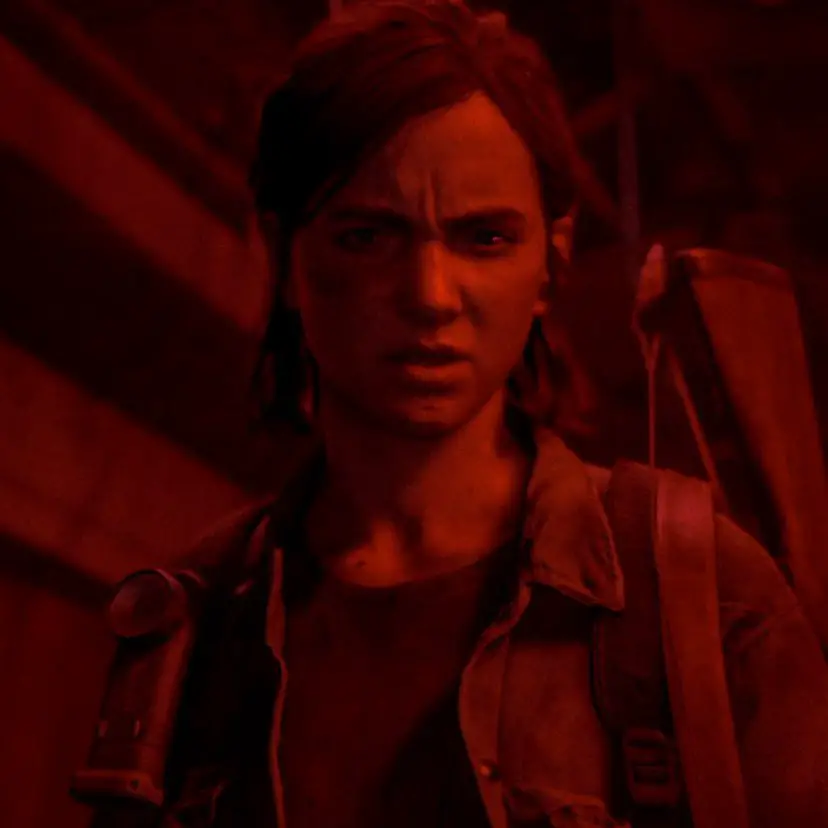
The pair head out to the next save location, which is an old building where Joel hid supplies. This is the kind of scene where the writing really shines. Our The Last of Us writers have a knack for comic relief – appropriate, realistic comic-relief, not anything silly or vapid. Joel, being a human, can’t remember where he hid his supplies in the building. Ellie jokes with him about it and then goes to explore the basement.
This is an interesting sequence for two main reasons. First, Ellie goes in search of items and finds a box of tampons. She says, “Picked over my ass,” quoting what Joel told her upstairs – that there wouldn’t be anything left. This combination of images and dialogue characterizes both Joel and Ellie: Joel wouldn’t think to look for tampons as a resource, while Ellie knows not to trust Joel absolutely. This is a good example of using the visual medium and the dialogue to show characterization, as opposed to telling it. Nicely done!
Second, the sequence with the trapped zombie gives us tons of characterization of Ellie while also providing important world-building. Ellie approaches the zomboroni, stuck under a pile of rubble but still alive. She isn’t afraid of it – in fact, she takes her time cutting open its forehead to study it, as if it were on a petri dish. After she’s satisfied, Ellie stabs it in the head with her knife.
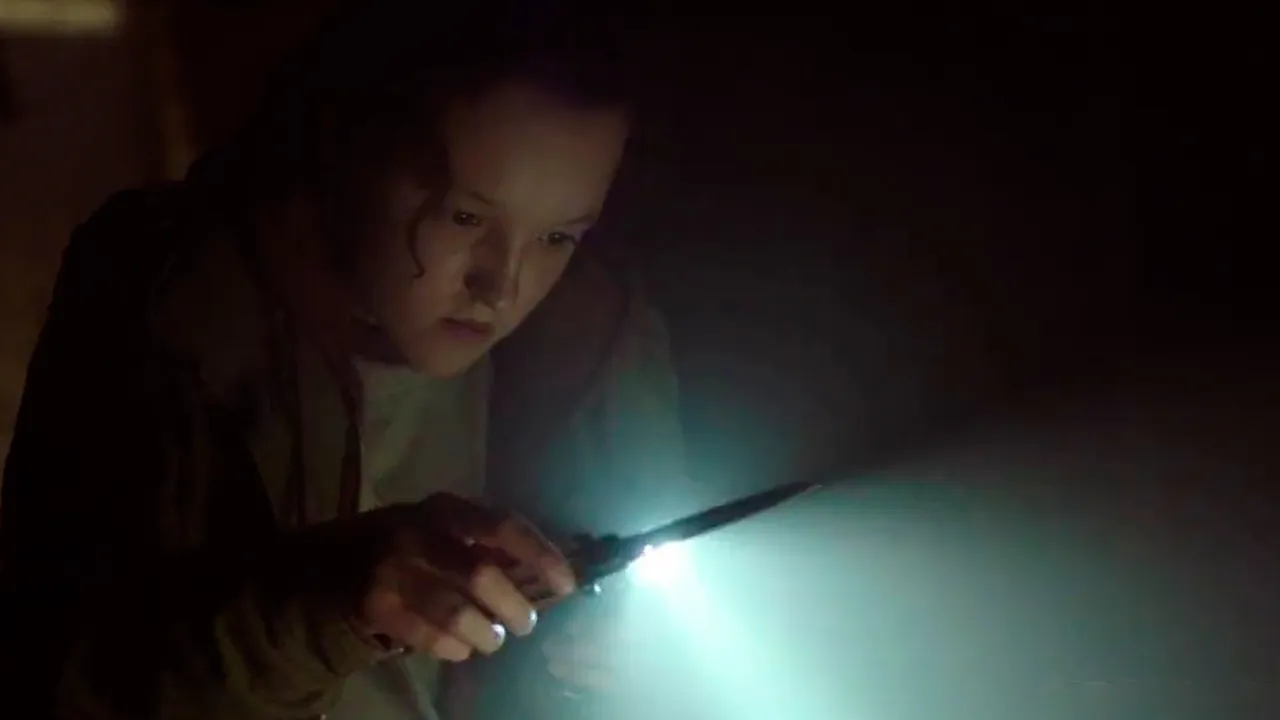
The Last of Us is pretty clearly indicating to us that Ellie is a touch psychopathic. The way she watched Joel beat a man to death in Episode 1, plus this scene of intentional cutting before killing, can only lead the audience to understand something is wrong with Ellie. And sure there’s plenty of reasons that would be – but it doesn’t really matter. What matters is that our girl Ellie definitely has a few screws loose very early on.
I also like that this scene indicates that the zombos don’t feel pain. The zombie didn’t react at all to getting cut, when it was clearly still “alive”. This makes all the rampant zombie destruction throughout the story more palatable, imho.
Our lovely pair continue down the road and exposit some more world-building for us. Joel explains that the whole world came crashing down over a weekend, basically, and the theory is that the contagion spread through something internationally traded like sugar or flour. He notes that people may have gotten infected from various foods and baked goods, including PANCAKE MIX!!!
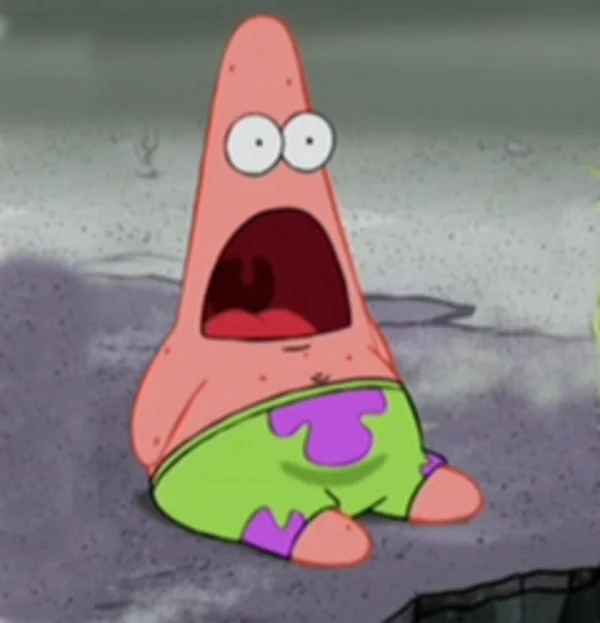
Joel and Ellie come across a mass grave alongside the road. Joel explains that FEDRA killed healthy people when there was no more room in the QZ’s. There are dozens of skeletons in the ditch. Did you know FEDRA was bad?? Do you get it???
The camera zooms in on a piece of clothing in the ditch (that is somehow not completely disintegrated in the last 20 years and still has color and a pattern on it), and this hilariously transitions to an innocent woman carrying a baby. You might think this woman and baby are important, since the camera specifically transitioned back in time two decades to look at them. But no – they just get on a bus and are literally driven off-screen. What film-major intern thought that transition was really, really cool?
Turns out that woman was only important because she was the neighbor of our new one-episode protagonist, Bill! Yay Bill!
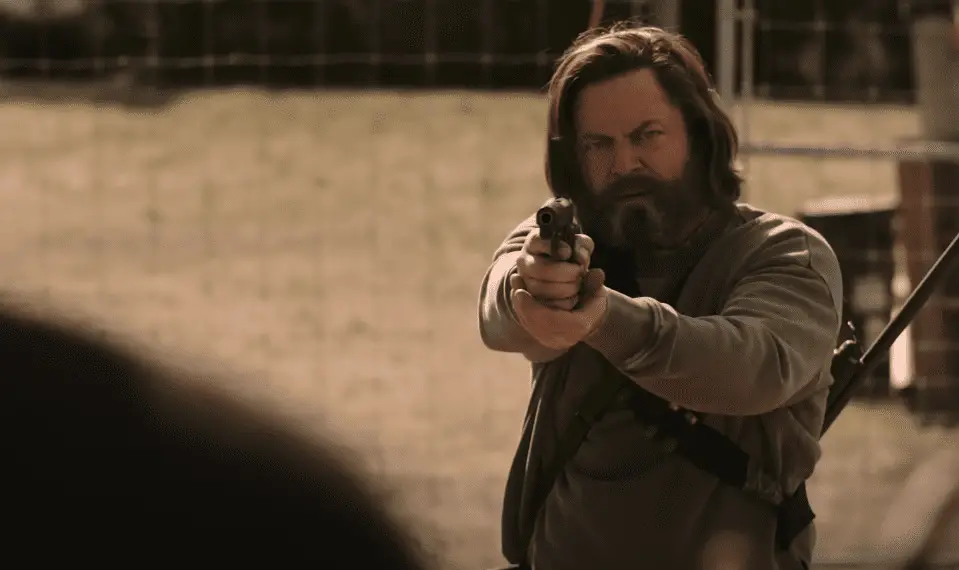
Bill (Nick Offerman) is a survivalist and conspiracy theorist who hides in his bunker until FEDRA leaves. We’re shown aspects of Bill’s life over a four-year period starting in 2003 as he lives alone in an entire neighborhood. He sets up traps, gathers supplies, and holds a #significant carrot up in the sun. Bill’s got it all worked out – until a living stranger falls into one of his traps.
Enter Frank (Murray Bartlett) and the best zombie-apocalypse meet-cute this side of Maggie and Glenn. Bill saves Frank from the trap, lets him shower, and gives him dinner. What’s great about these scenes is the acting – there isn’t all that much dialogue between them. But the actors tell you the story with their facial expressions, tone of voice, and especially eye movements. It was clear, at least for me, that there was sexual tension between Bill and Frank that increased through the dinner scene. I do also like the play on gay stereotypes – both Bill and Frank appreciate how to pair wine, for example, and both know about antiques. These aren’t harmful gay stereotypes (neither of them are presented as foolish or silly), but they’re enough to tip off the viewer and, importantly, to tip off each other.
Frank finally breaks the ice by kissing Bill, and the audience around the world collectively went AWWW!!!
And so begins the bulk of the episode. We spend roughly an hour of a 1.5 hour episode with Bill and Frank over the years, watching them navigate their lives living alone in the apocalypse. Turns out Frank made friends with Tess over the radio, so we get the sweetest little garden party scene with the recluses and our mains, Joel and Tess.
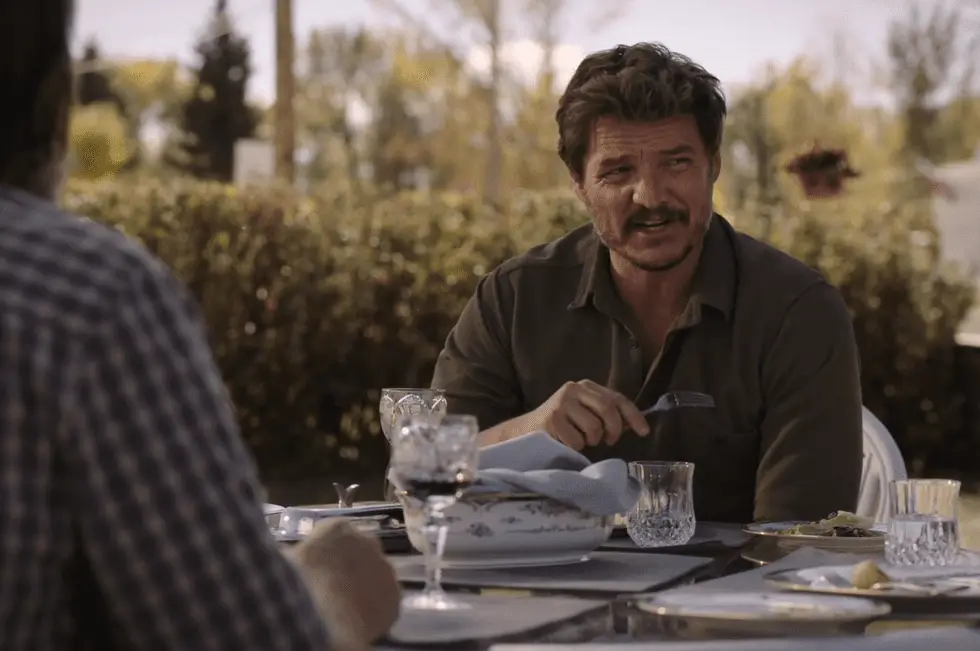
The niceness of the atmosphere, especially in an apocalypse show, creates a foreboding feeling as it goes on. Viewers, especially fans of the game, are wondering when the other shoe is gonna drop. But while there is one scene of “raiders” coming to their complex, there is no other shoe drop – Bill and Frank basically get to live normal lives until they’re old and sick. They decide to commit suicide together, and I won’t describe it any more than that because I’d rather not cry directly onto my keyboard and ruin my computer. But yes, it is an extremely powerful sequence.
Flash (somewhat) forward to Joel and Ellie arriving at Bill’s house. They discover a suicide note and that the bedroom door, where the bodies are, is locked. This is one weak portion of the episode: Ellie reads the suicide note out loud, and pretty much just exposits one of the story’s themes directly onto screen. I mean she literally read the script at us. The letter is all about saving the people you love etc., yada yada, be the change you want to see in the world kind of hippie bullshit. It’s nothing fascinating or illuminating – like all the themes in The Last of Us game series, it’s fine but basic.
The letter does mention Joel protecting Tess as the one he loves, which makes Joel go outside and stare dramatically into the middle-distance. I’m still confused by this – were they together? She said he didn’t have the same feelings as her? It doesn’t count as a romantic relationship if it wasn’t on screen. I can’t be expected to assume any man within the vicinity of any woman must be romantically involved, that’s too much hetero shit for me.
The episode ends with Joel and Ellie getting some lovely items from Bill’s basement and taking his truck. Joel decides they’ll head to the next checkpoint together, which is somewhere out west in Wyoming where his brother Tommy lives. The screen fades to black, and everyone simultaneously went to get some tissues.
Analysis: Good TV, Bad Episode
I would like to say at the outset that I enjoyed watching this episode and, outside the context of the greater narrative, I would give this an 8 out of 10 – it’s an interesting story that avoids tropes and stereotypes, the people are characterized well, and the character arcs are complete within the narrative. Like the rest of The Last of Us, the writing is above-average but not stellar. Keep in mind that I personally would only give certain episodes of Black Sails a 10, and maybe an episode of House of the Dragon a 9 – so 8 is my soft ceiling.
But – and this is a big but – I’m not sure this is a good episode of The Last of Us. As a stand-alone piece it’s good; but as part of a season-long narrative, I’m wildly confused. This is a zombie apocalypse story. We have clear main characters in Joel and Ellie. If your episode does not advance the substantive and thematic plots of your main characters, well then, I hate to say it, but it’s filler. And we don’t have time for filler in a 9-episode season!
Now there is some plot advancement for Joel and Ellie in that they get items they need. Okay, that’s fine, I wouldn’t exactly consider that substantive as much as it is logistical. And Ellie clumsily reading a theme on screen is not the kind of theme advancement that justifies an hour-and-a-half long episode. The whole thing felt much too tangential to justify its presence as an entire episode. Indeed, we spend like 55 minutes with two characters who we will never see again because they’re dead. Only George R.R. Martin can get away with killing off vital characters before the narrative begins, and he’s even on this ice with that shit.
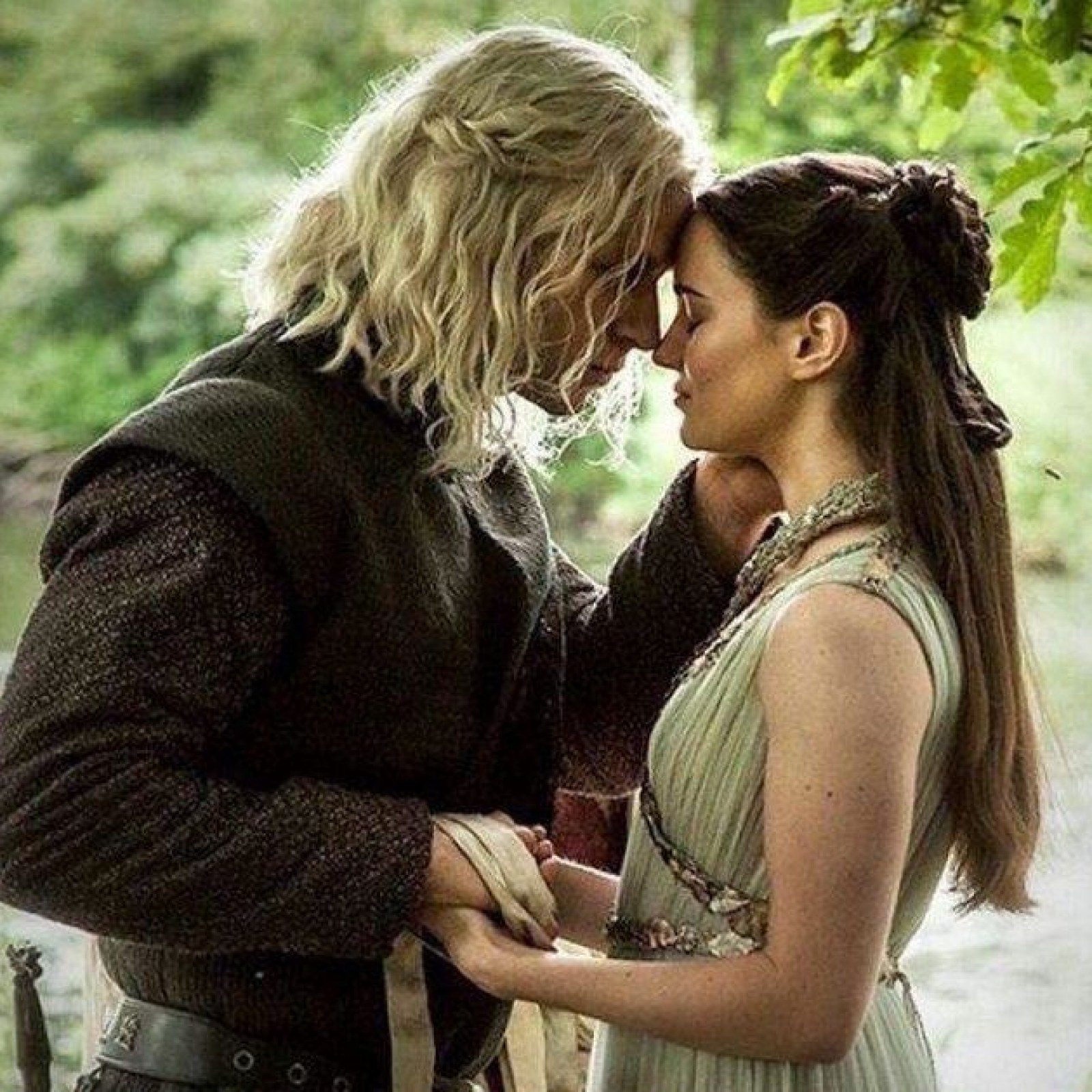
And really the problem here is that Bill and Frank aren’t vital characters. They aren’t even important characters. They are the definition of side characters. I mean they’re so on the sidelines that they don’t meet 50% of our mains, because they’re dead by the time Ellie gets there! Why are we watching them for so long??
Look, I like this story. I much prefer this adaptation of Bill and Frank over the little we get of them in the game. This is a positive change and good representation of LGBTQ+ people in media. And I really appreciate that they didn’t fall into the various depressing tropes that plague gay characters like an uncontrolled fungal disease. At the same time, I cannot ignore that a narrative that purports to have a purpose must include that purpose on screen. The near-complete disconnect between Bill and Frank and Joel and Ellie truly undermines the impact of this episode on the season-long narrative arc. Indeed, I guarantee you – I guarantee you – Bill and Frank will never be brought up again.
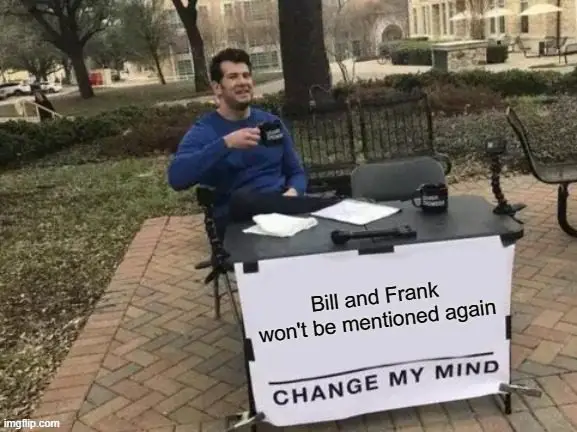
And that prediction is based on the fact that it isn’t clear at all that Bill and Frank, and their lovely little plot cul-de-sac, had any impact on the character arcs of Joel or Ellie.
What bothers me about that is that it was definitely possible to write this lovely romance while also connecting it to our mains. With a little tweaking of the episode plot, we could have easily had Joel telling Ellie about outbreak day and the years after the infection started – the same time period covered by the romance – and had intercut that walking-and-talking with scenes of Bill’s lived experience that related. For example, Joel could’ve talked about how people turned on each other, and then we could’ve gotten the raiders scene. Indeed, this could characterize Joel: maybe he downplays how bad it was for Ellie’s sake, then we see really how bad it was from Bill’s perspective. Etcetera, you get the gist.
The structure of the episode as a Bill and Frank sandwich between the Joel and Ellie bread created a disconnect from the main storyline that is hard to overcome. So while it was a lovely episode of TV, as of this writing I don’t see it as an acceptable episode of The Last of Us. I will, however, hold my final judgment on it until we get the whole season – future episodes may change this analysis, and I’m willing to wait and see.
Additionally, I’ve seen plenty of articles praising to high heavens the acting in the episode and the compelling romance, and all the emotion, you know the good stuff. And yeah those are good things for sure. But, people do realize that gay media exists, right? Like there are plenty of stories out there about men falling in love. Many of the articles read a little too surprised that this kind of love story worked so well. That is a concerning tone we should keep tabs on moving forward. If you want to hear specific analysis of gay media by LGBTQ+ people, check out my podcast Gaze.
Last fun detail – when Joel gets to Bill’s basement and finds the music playing, he explains to Ellie that that happens automatically when Bill hasn’t reset the machine in a while. I *think* that was the same song that played over the radio in episode 1 – so, we can approximately line up these plotlines. Neato!
In sum, I’m reserving my rating for episode 3 until the season is done because it’s a good episode of television, but as of now an unconvincing episode of The Last of Us. I’m still left asking myself, why did I just watch this? That is my completely subjective and arbitrary analysis as of now.
Check back next week for coverage of Episode 4. And if you want more The Last of Us content, check out my TikTok @beelock where we hold a live discussion each Sunday night after the episode, and also stream playing The Last of Us 2.
Images courtesy of HBO.
Have strong thoughts about this piece you need to share? Or maybe there’s something else on your mind you’re wanting to talk about with fellow Fandomentals? Head on over to our Community server to join in the conversation!

